module 7 unit 2 Fit for life reading(36ppt)
文档属性
| 名称 | module 7 unit 2 Fit for life reading(36ppt) |
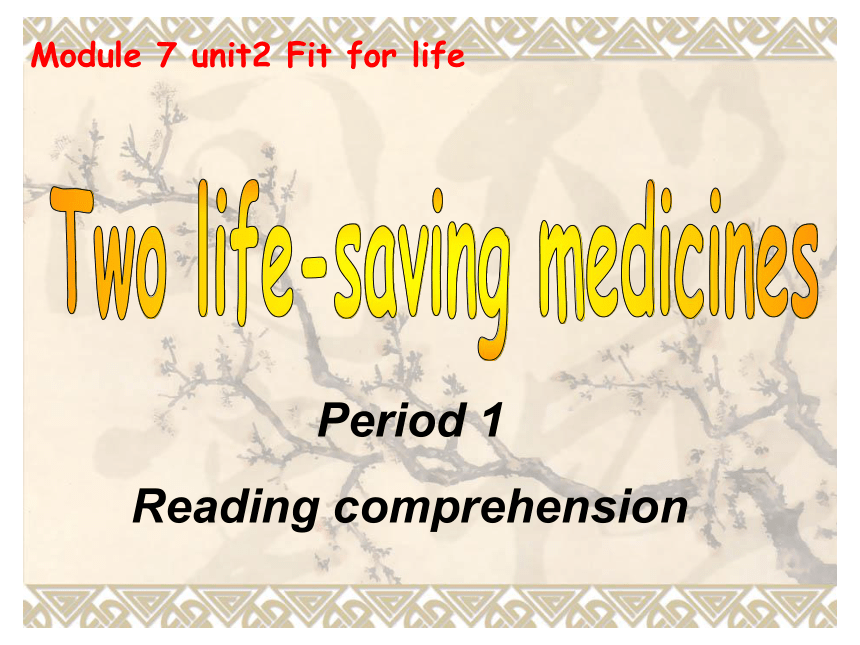
|
|
| 格式 | rar | ||
| 文件大小 | 883.4KB | ||
| 资源类型 | 教案 | ||
| 版本资源 | 牛津译林版 | ||
| 科目 | 英语 | ||
| 更新时间 | 2017-11-06 00:00:00 | ||
图片预览

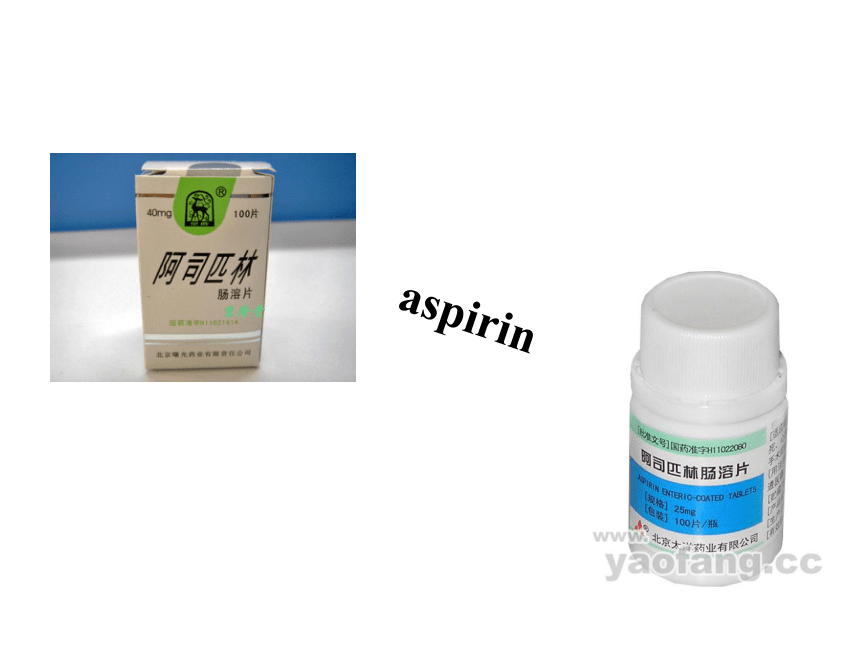
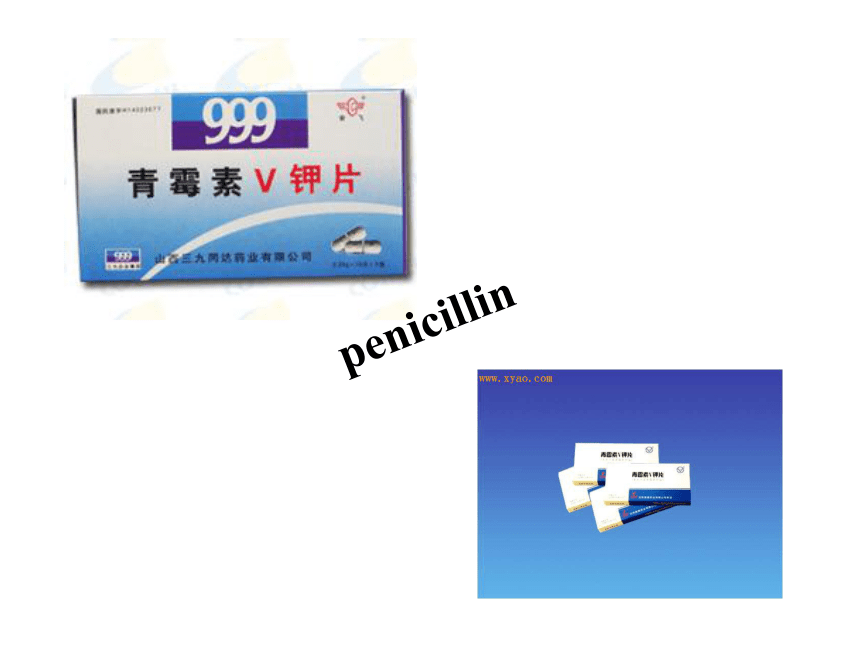
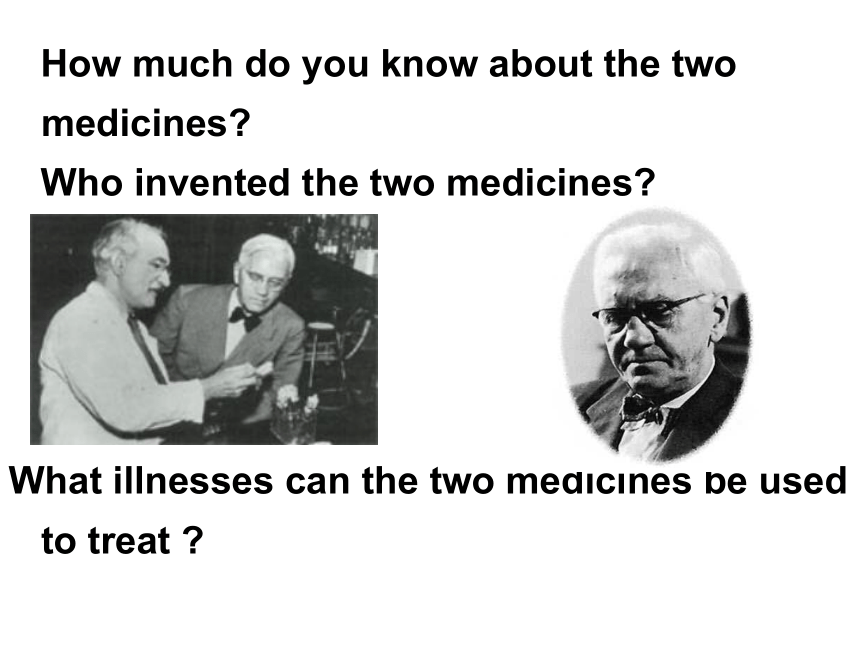
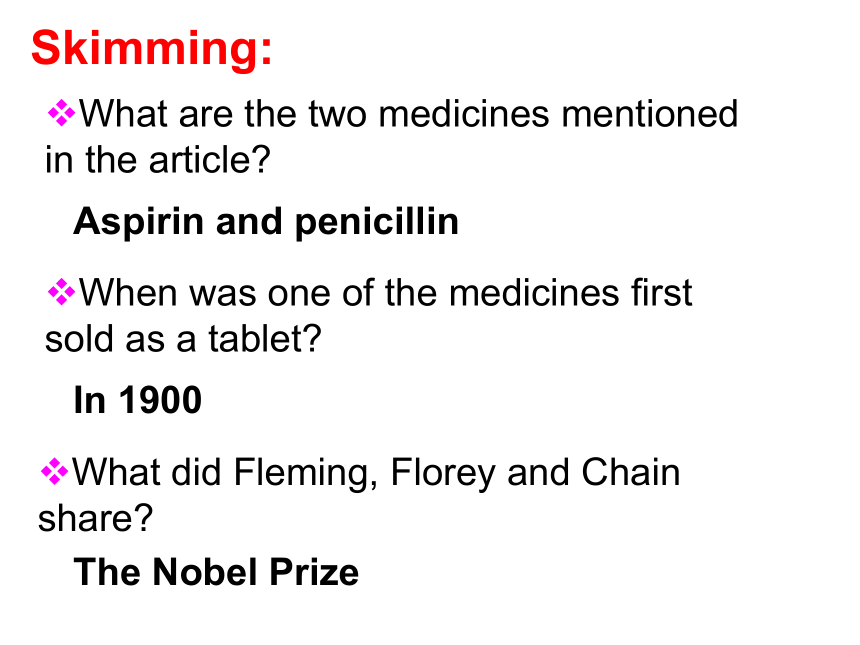
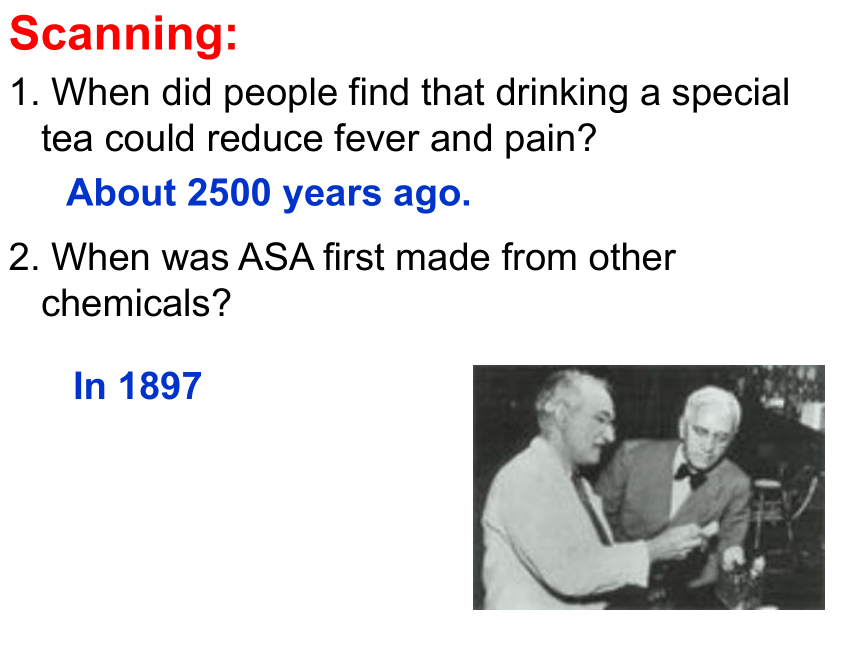
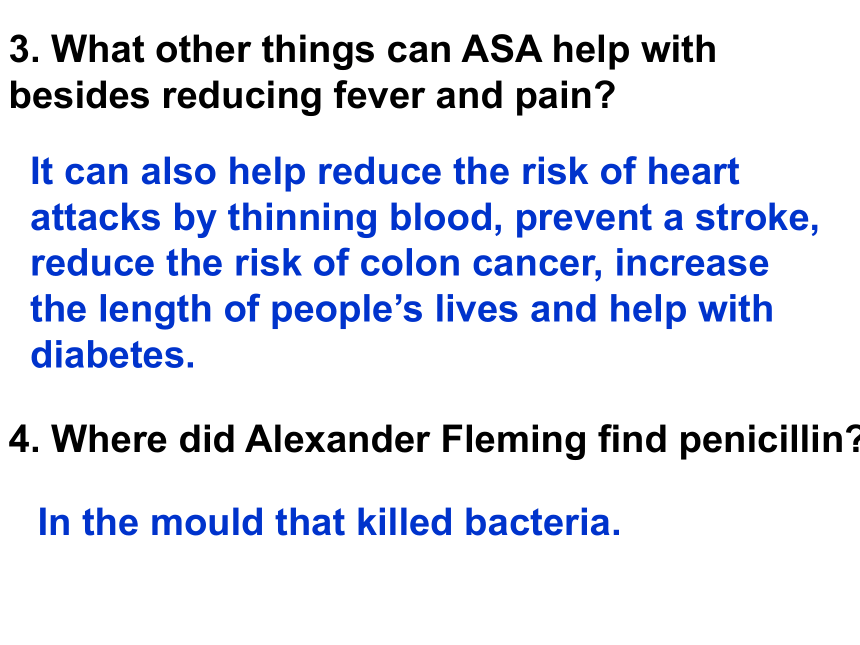
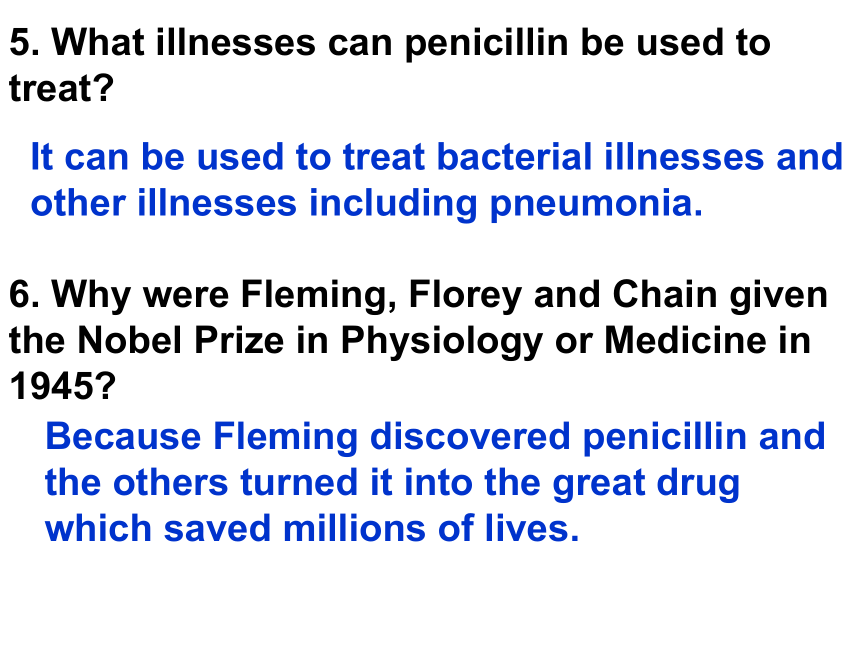
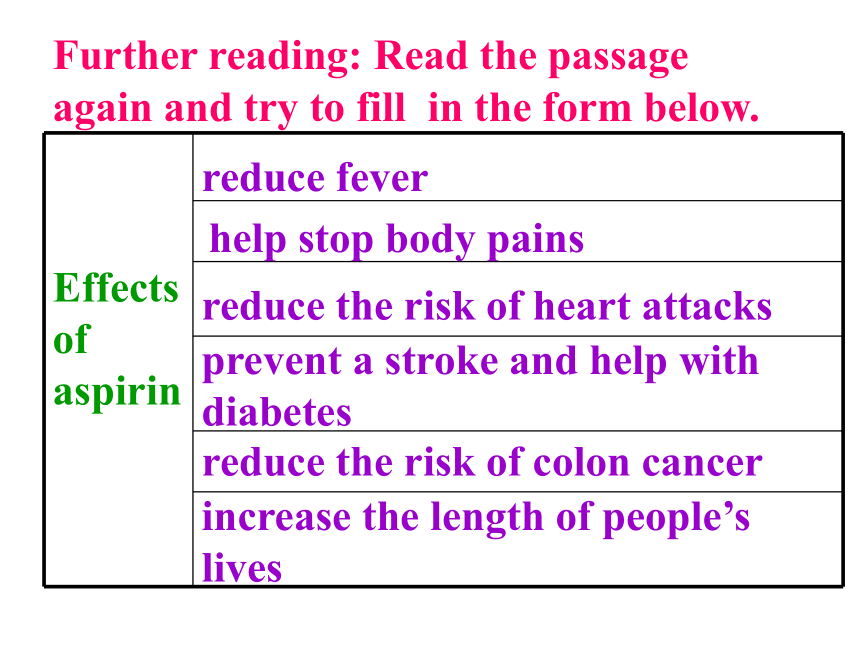
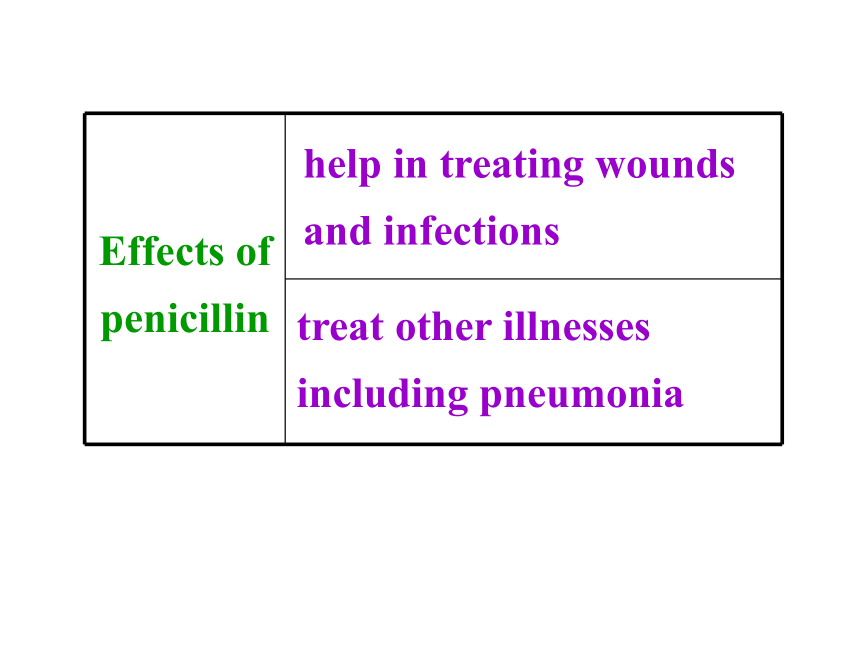
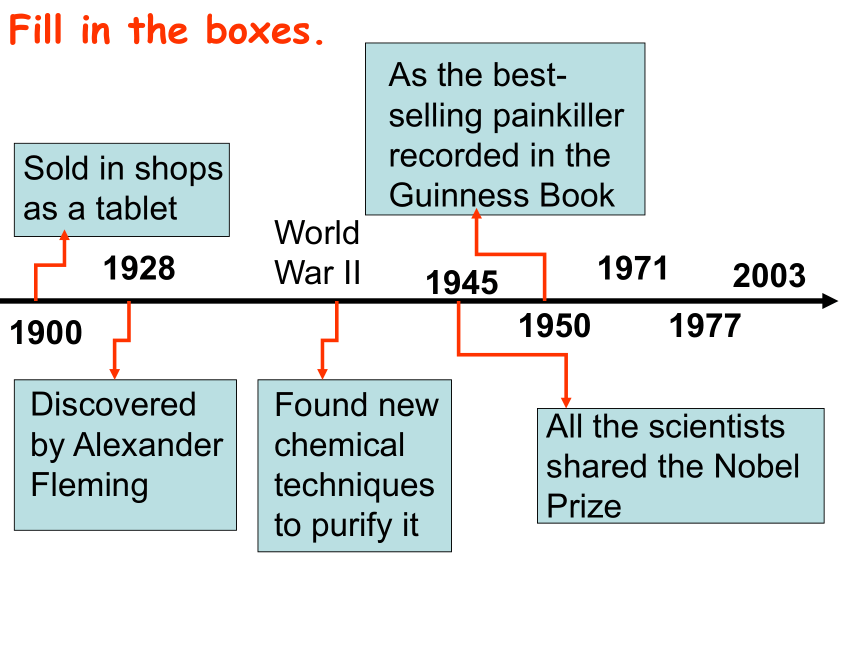
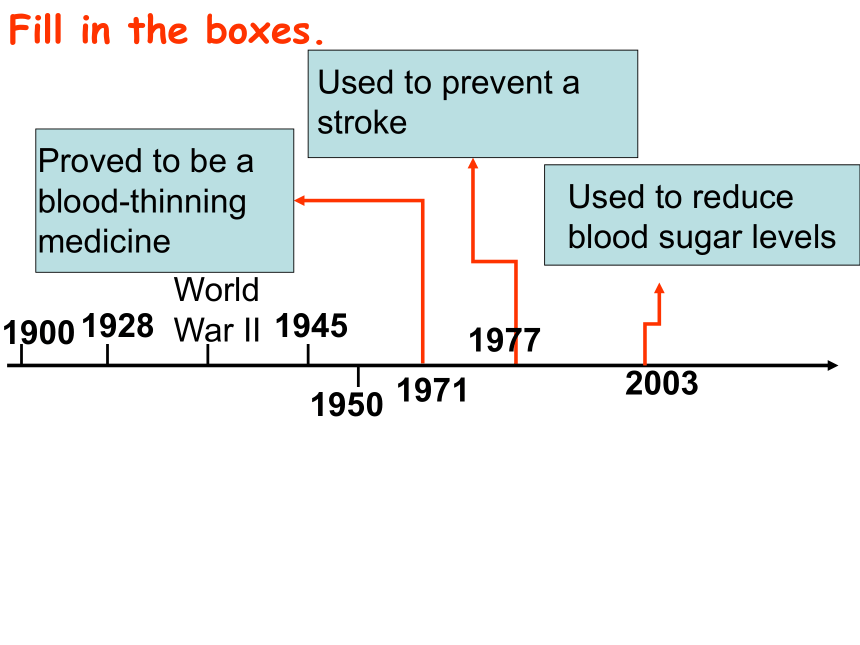
文档简介
课件36张PPT。Module 7 unit2 Fit for lifeTwo life-saving medicines Period 1
Reading comprehension aspirinpenicillin How much do you know about the two medicines?
Who invented the two medicines?
What illnesses can the two medicines be used to treat ?
What are the two medicines mentioned in the article?When was one of the medicines first sold as a tablet?What did Fleming, Florey and Chain share?Skimming:Aspirin and penicillinIn 1900The Nobel Prize1. When did people find that drinking a special tea could reduce fever and pain?
2. When was ASA first made from other chemicals?
Scanning:About 2500 years ago.In 18973. What other things can ASA help with besides reducing fever and pain?
4. Where did Alexander Fleming find penicillin?
It can also help reduce the risk of heart attacks by thinning blood, prevent a stroke, reduce the risk of colon cancer, increase the length of people’s lives and help with diabetes.In the mould that killed bacteria. 5. What illnesses can penicillin be used to treat?
6. Why were Fleming, Florey and Chain given the Nobel Prize in Physiology or Medicine in 1945?It can be used to treat bacterial illnesses and other illnesses including pneumonia.Because Fleming discovered penicillin and the others turned it into the great drug which saved millions of lives.Further reading: Read the passage again and try to fill in the form below.reduce feverhelp stop body painsreduce the risk of heart attacksprevent a stroke and help with diabetesreduce the risk of colon cancerincrease the length of people’s liveshelp in treating wounds and infectionstreat other illnesses including pneumoniaFill in the boxes.Sold in shops as a tablet19001928Discovered by Alexander FlemingWorld War IIFound new chemical techniques to purify itAll the scientists shared the Nobel Prize1945As the best-selling painkiller recorded in the Guinness Book19501971197720031900Proved to be a blood-thinning medicineUsed to prevent a strokeUsed to reduce blood sugar levelsFill in the boxes.match1. physician2. bark3. painkiller4. thinning5. contemporary6. transparent7. purify8. quantities9. widespreada. modern, of present timeb. happening in a lot of placesc. a medical doctor who does not
perform operationsd. amounts of somethinge. the skin of a treef. to make pureg. a type of medicine used to
reduce painh. clear and able to be seen throughi. making a liquid less thickFill in the blanks with the correct wordaspirin a medicine that was __________in 1897. It has saved and brought relief to millions of people’s lives. It is made from a chemical called _____and was first sold as a tablet in 1900. This was the first medicine to be sold as a standardized ______. It works by reducing fever and pain. It is now______________for reducing potential heart attacks, strokes and cancer. Many reports have been___________about how aspirin can improve people’s health.published; recommended; ASA; tablet ; inventedinventedASAtabletrecommendedpublishedFill in the blanks with the correct wordcontemporary; discovered; availablepenicillin a chemical in mould that was first __________in 1928, but it was not until World War II that penicillin was purified to be used as a medicine. It was needed as soon as it was ________because there were many people injured in the war. It was fundamental to saving many thousands of lives and is one of the most important medicines of _____________society.discoveredavailablecontemporaryDiscussion What do you think the world would be like if there were no medicines? 1. What would the world be like if the two medicines had not been discovered?
2. Do you believe that ‘wonder drugs’ will be invented to treat diseases like AIDS in the future?DiscussionHomeworkRetell the text.
Finish EX. D1 on page113 Period 2
Language points and
difficult sentencesPart 1 Aspirinopen up ① (使某物) 打开,张开,开发,裂开
Coughing like that might open up your wound.
你那样咳嗽会把伤口震开的。
A move to New York would open up all kinds of exciting
new possibilities.
迁到纽约会带来各种令人振奋的新机遇。
② (不拘束) 畅谈,倾吐心事
After a few drinks, the old man began to open up a bit and
told us his stories in the battles.
几杯酒下肚后,那位老人的话多了起来,开始讲他的战斗
故事。
注意:
嘴巴张开、眼睛睁开及门、窗、箱子、瓶子、商店的开用
open。会议和辩论的开始用open。
开辟新的机会和可能性用open up。 2. There is a high probability that … ……的可能性很大
Because he works so hard, there is a high probability that
he will pass the entrance examination.
因为他学习努力,他通过入学考试的可能性很大。
There is a 50% probability that the population will be
infected with the disease.
民众感染这种病的概率为50%。
链接: in all probability 很可能,十有八九
There is a/ no possibility of (doing) sth / that …
有/ 没有……的可能性。
There is no chance of doing sth/ that …… 没有机会做……
There is no probability of (doing) sth. (做)某事没有可能性
--- Is there any possibility ____ you could pick me up at the
airport ? --- No problem. (2009,浙江高考 )
A. when B. that C. whether D. what B3. recommend v. 建议,推荐
recommend doing sth 建议做某事
(建议) sb to do sth 建议某人做某事
that-clause (谓语动词用虚拟语气) 建议……
recommend sth to sb 向某人推荐某事物
(推荐) sb for sth 推荐某人担任某职务
sb as … 推荐某人为……
I recommend going by subway. 我建议坐地铁去。
The doctor recommended me to take a long rest.
医生劝我长期修养。
The teacher recommends that we (should) read the novel.
老师劝我们读那部小说。
I recommended her as your secretary.
我推荐她当你的秘书。
He will recommend you for the job.
他将会推荐你担任那项职务。{{4. particular adj. ① 特定的;显著的;特别的
I didn’t feel well on that particular evening.
就在那一个特别的傍晚,我觉得不大舒服。
I have nothing particular to do today.
今天我没有特别的事情要做。
② 讲究的;挑剔的
She is particular about her clothes.
她对衣着很讲究。
拓展:
be particular about 对……特别讲究;挑剔的
in particular 尤其,特别(常位于所修饰的名词后面)
go into particulars 详细说明father of all doctors 医生之父
注意:father 为头衔用语。表示职位或头衔时,名词在句
中作表语、补足语或同位语时,名词前不加冠词。
We will elect Engineer Liu director of our factory.
我们将选刘工程师为我们厂的领导。
Mr. Wang, professor of Chongqing University, was elected
principal of the university.
王先生,重庆大学的教授,被选为大学的负责人。
链接:其他不用冠词的几种情况:
1)名词前已有this, that, my, some, each等限定词或修饰语
时,不再用冠词。
China’s second longest river 中国第二长河
2)复数名词表示某一类人或事物,或泛指数量不定的人或
物时,其前不再用冠词。
Bicycles are still very useful nowadays.现在自行车仍很有用3) 在turn(变成)后作表语的名词前。而become(变成)后须
带冠词。
He became a doctor while his sister turned teacher.
他成了一位大夫,而他的妹妹成了一名教师。
4)编号前不加冠词:Room 808; Lesson 8; Gate 2
5) 在as引导的让步状语从句中,位于句首的单数名词或
形容词的最高级前不加冠词。
Shortest as he is, he runs fastest in our class.
他尽管最矮,但在我们班却是跑得最快的。
Child as he is, he knows much about the world.
虽然只是个孩子,但他对世界的东西知道得很多。
6)与by连用的交通工具名词前不用冠词。
By bus, by train, by plane, by ship, by air/ sea/ land
7) 在成对使用的词组中不用冠词。
husband and wife hand in hand day by day6. It is/ was + 被强调部分 + that/ who + 其它部分
强调句型,可用来强调句中除谓语和定语外的任何成分。
My uncle bought a new car yesterday.
It was my uncle who/ that bought a new car yesterday.
It was a new car that my uncle bought yesterday.
It was yesterday that my uncle bought a new car.
注意:
根据需要,可以在be前加might/ may/ must等情态动词。
It might be during the outing that he lost his watch.
2. 强调句的反义疑问句的主语及助动词必须和主句一致。
It is he not I who wants to ask you about it, isn’t it?
It was at the party that they met each other, wasn’t it?
3. 注意强调句的特殊疑问句形式。
结构: 特殊疑问词 + is/ was it that + 其他部分
When was it that he came here?4. 注意 not…until 的强调句构成。
I didn’t recognize her until she took off her dark glasses.
It was not until she took off her dark glasses that I
recognized her.
5. 该句式不用来强调谓语动词,若对谓语动词强调,来加
强语气,通常用do的各种形式,同时用do的各种形式表示
时态,其后动词用原形。常用于肯定句和祈使句中。
I do believe you.
She did clean the room this morning.
He does live in Beijing.
经典回放:
It was _____ he came back from Africa that year ____ he
met the girl he would like to marry.
when, then B. not, until
C. not until, that D. only, whenC7. ever adv.
①以前;曾经(用于疑问句)
Did you ever meet him while you were in London?
你在伦敦时曾经见过他吗?
②无论什么时候都(不)(用于否定句)
Nothing new ever happened in this village.
这个小村庄未曾发生过什么新鲜事。
③曾经(用于if从句)
If you ever have any problems, let me know.
你若有任何问题,就告诉我。
④到底,究竟(用于特殊疑问句,加强语气)
Where ever have you been? 你到底去哪儿了?
Who ever is the strange man with Susan?
和苏珊在一起的那个陌生人究竟是谁?⑤ 永远,总是(用于肯定句中)
You’ll find me ever at your service.
你会发现我永远听命于你。
拓展:
as … as ever 依然,照旧
hardly ever 几乎从来不
…than ever 比以前任何时候都……
never ever 从不,绝不,永不
ever since 从那以后
for ever (and ever) 永远
if ever 很少,难得
as ever 同往常一样8. not only … but also…当他们连接两个并列句,not only
位于句首时,not only部分须采用倒装语序,即采用
“ 助动词 + 主语 + 动词原形”的方法,而but also部分不倒
装。当它们连接并列主语时,与either…or…一样,谓语
动词须采用就近一致原则。
Not only should you read more, but also you should listen
more. 你不仅应该多读,而且应该多听。
Not only you but also I am unlucky this time.
这次我们两个都很不走运。
经典回放:
The computer was used in teaching. As a result, not only
____, but students became more interested in the lessons.
(2009, 宁夏/ 海南高考)
saved was teachers’ energy B. was teachers’ energy saved
C. teachers’ energy was saved D. was saved teachers’ energyB9. burst v. ① 破裂,决口
The balloon suddenly burst. 气球突然破了。
The dam burst because of heavy rain.
因为大雨,大堤决口了。
② 装满,几乎胀破(用进行时)
The bag is bursting with nuts. 那个包装满了坚果。
③ 突然……起来,使突然发出……声音来
The door burst open. 门突然打开了。
He burst into tears. 他突然大哭起来。
拓展:
burst into laughter = burst out laughing 突然大笑
burst into tears = burst out crying 突然哭起来
burst into song 突然唱起来 burst forth 突然出现
burst into 突然闯入, 突然开始 a burst of speed 突然加速
be bursting to do 急于要做10. contemporary adj. 当代的,同朝代的
My studies were devoted almost entirely to contemporary
literature.
我的研究几乎全部集中在当代文学上了。
The telephone and the gramophone were contemporary.
电话和留声机是同一时代的产物。
拓展:
contemporary art 现代艺术
contemporary authors 当代作家
contemporary composers 同时代的作曲家
注意:
contemporary也可作名词用,意为“同时代的人;同龄人/
辈的人”。如:
John is a contemporary of mine.
约翰与我同龄。11. name n. 名字,名称;名誉,名声
They checked his name off as he boarded the plane.
在他登上飞机时,他们登机了他的名字。
He has a good name in the business. You can trust him.
他在这一行信誉很好,你可以相信他。
注意:name作此意讲时,多指社会对人或物的评价,为单
数可数名词,可与冠词a连用。
v. 取名, 起名; 说出……的名字; 决定, 任命, 提名
Can you name all the plants and the trees in this garden?
你能说出这个花园里所有花草树木的名称吗?
Mr. Michael has been named as the new manager.
迈克尔先生被任命为新的经理。
拓展: call sb. names 辱骂某人 in name 名义上的, 表面上的
name names 点名道姓,公开点名
under the name of 用……作名字 12. application n. 应用, 运用; 申请书, 申请表; 勤奋, 努力
The new invention would have wide application in industry.
这项新发明会在工业上得到广泛应用。
I wrote 5 applications for jobs but got nothing.
我写了5份求职申请书,但什么也没得到。
Success demands great application.
要成功就要全力以赴。
单词积累:
apply v. 申请,应用
applied adj. 应用的
applicant n. 申请人13. mass n. ① 块,堆,团
The cold air masses are moving from Siberia towards Inner
Mongolia. 冷空气团正由西伯利亚向类蒙古移动。
② 大量;大批;众多
There is a mass of stones in the yard.
院子里堆放着一堆石头。
③ 群众
The masses are the creators of history.
群众是历史的真正创造者。
adj. 许多的,大规模的;群众的
We’ll never forget the mass murder in Nanjing.
我们永远不会忘记南京大屠杀。
拓展: in mass 全体,整个地 in the mass 大体而论
mass entertainment 大众娱乐 the masses 民众,平民
mass murder 灭绝人性的屠杀 a mass of / masses of 大块else 的用法总结
①else adj. & adv. 意为“其他的(地); 别的(地); 另外的(地)
附加的(地); 更多的(地)”。else通常放在疑问代词、疑问副
词或不定代词之后。
I’m sorry. I mistook you for somebody else.
很抱歉,我错把你当成别人了。
Anything else I can do for you ? 我能为你做点别的事吗?
②else经常与其他介词如but, except和besides连用。
No one else but Tom saw the accident.
除了汤姆,没有别人看到这起事故。
③当一个代词跟else时,所有格的形式一般写成someone
else’s, 而不是someone’s else。who else’s 和whose else 都可
以使用,但不使用whose else’s 。
拓展: or else 否则,不然的话
else other than 只是,仅有 nothing else but只有,只不过
Reading comprehension aspirinpenicillin How much do you know about the two medicines?
Who invented the two medicines?
What illnesses can the two medicines be used to treat ?
What are the two medicines mentioned in the article?When was one of the medicines first sold as a tablet?What did Fleming, Florey and Chain share?Skimming:Aspirin and penicillinIn 1900The Nobel Prize1. When did people find that drinking a special tea could reduce fever and pain?
2. When was ASA first made from other chemicals?
Scanning:About 2500 years ago.In 18973. What other things can ASA help with besides reducing fever and pain?
4. Where did Alexander Fleming find penicillin?
It can also help reduce the risk of heart attacks by thinning blood, prevent a stroke, reduce the risk of colon cancer, increase the length of people’s lives and help with diabetes.In the mould that killed bacteria. 5. What illnesses can penicillin be used to treat?
6. Why were Fleming, Florey and Chain given the Nobel Prize in Physiology or Medicine in 1945?It can be used to treat bacterial illnesses and other illnesses including pneumonia.Because Fleming discovered penicillin and the others turned it into the great drug which saved millions of lives.Further reading: Read the passage again and try to fill in the form below.reduce feverhelp stop body painsreduce the risk of heart attacksprevent a stroke and help with diabetesreduce the risk of colon cancerincrease the length of people’s liveshelp in treating wounds and infectionstreat other illnesses including pneumoniaFill in the boxes.Sold in shops as a tablet19001928Discovered by Alexander FlemingWorld War IIFound new chemical techniques to purify itAll the scientists shared the Nobel Prize1945As the best-selling painkiller recorded in the Guinness Book19501971197720031900Proved to be a blood-thinning medicineUsed to prevent a strokeUsed to reduce blood sugar levelsFill in the boxes.match1. physician2. bark3. painkiller4. thinning5. contemporary6. transparent7. purify8. quantities9. widespreada. modern, of present timeb. happening in a lot of placesc. a medical doctor who does not
perform operationsd. amounts of somethinge. the skin of a treef. to make pureg. a type of medicine used to
reduce painh. clear and able to be seen throughi. making a liquid less thickFill in the blanks with the correct wordaspirin a medicine that was __________in 1897. It has saved and brought relief to millions of people’s lives. It is made from a chemical called _____and was first sold as a tablet in 1900. This was the first medicine to be sold as a standardized ______. It works by reducing fever and pain. It is now______________for reducing potential heart attacks, strokes and cancer. Many reports have been___________about how aspirin can improve people’s health.published; recommended; ASA; tablet ; inventedinventedASAtabletrecommendedpublishedFill in the blanks with the correct wordcontemporary; discovered; availablepenicillin a chemical in mould that was first __________in 1928, but it was not until World War II that penicillin was purified to be used as a medicine. It was needed as soon as it was ________because there were many people injured in the war. It was fundamental to saving many thousands of lives and is one of the most important medicines of _____________society.discoveredavailablecontemporaryDiscussion What do you think the world would be like if there were no medicines? 1. What would the world be like if the two medicines had not been discovered?
2. Do you believe that ‘wonder drugs’ will be invented to treat diseases like AIDS in the future?DiscussionHomeworkRetell the text.
Finish EX. D1 on page113 Period 2
Language points and
difficult sentencesPart 1 Aspirinopen up ① (使某物) 打开,张开,开发,裂开
Coughing like that might open up your wound.
你那样咳嗽会把伤口震开的。
A move to New York would open up all kinds of exciting
new possibilities.
迁到纽约会带来各种令人振奋的新机遇。
② (不拘束) 畅谈,倾吐心事
After a few drinks, the old man began to open up a bit and
told us his stories in the battles.
几杯酒下肚后,那位老人的话多了起来,开始讲他的战斗
故事。
注意:
嘴巴张开、眼睛睁开及门、窗、箱子、瓶子、商店的开用
open。会议和辩论的开始用open。
开辟新的机会和可能性用open up。 2. There is a high probability that … ……的可能性很大
Because he works so hard, there is a high probability that
he will pass the entrance examination.
因为他学习努力,他通过入学考试的可能性很大。
There is a 50% probability that the population will be
infected with the disease.
民众感染这种病的概率为50%。
链接: in all probability 很可能,十有八九
There is a/ no possibility of (doing) sth / that …
有/ 没有……的可能性。
There is no chance of doing sth/ that …… 没有机会做……
There is no probability of (doing) sth. (做)某事没有可能性
--- Is there any possibility ____ you could pick me up at the
airport ? --- No problem. (2009,浙江高考 )
A. when B. that C. whether D. what B3. recommend v. 建议,推荐
recommend doing sth 建议做某事
(建议) sb to do sth 建议某人做某事
that-clause (谓语动词用虚拟语气) 建议……
recommend sth to sb 向某人推荐某事物
(推荐) sb for sth 推荐某人担任某职务
sb as … 推荐某人为……
I recommend going by subway. 我建议坐地铁去。
The doctor recommended me to take a long rest.
医生劝我长期修养。
The teacher recommends that we (should) read the novel.
老师劝我们读那部小说。
I recommended her as your secretary.
我推荐她当你的秘书。
He will recommend you for the job.
他将会推荐你担任那项职务。{{4. particular adj. ① 特定的;显著的;特别的
I didn’t feel well on that particular evening.
就在那一个特别的傍晚,我觉得不大舒服。
I have nothing particular to do today.
今天我没有特别的事情要做。
② 讲究的;挑剔的
She is particular about her clothes.
她对衣着很讲究。
拓展:
be particular about 对……特别讲究;挑剔的
in particular 尤其,特别(常位于所修饰的名词后面)
go into particulars 详细说明father of all doctors 医生之父
注意:father 为头衔用语。表示职位或头衔时,名词在句
中作表语、补足语或同位语时,名词前不加冠词。
We will elect Engineer Liu director of our factory.
我们将选刘工程师为我们厂的领导。
Mr. Wang, professor of Chongqing University, was elected
principal of the university.
王先生,重庆大学的教授,被选为大学的负责人。
链接:其他不用冠词的几种情况:
1)名词前已有this, that, my, some, each等限定词或修饰语
时,不再用冠词。
China’s second longest river 中国第二长河
2)复数名词表示某一类人或事物,或泛指数量不定的人或
物时,其前不再用冠词。
Bicycles are still very useful nowadays.现在自行车仍很有用3) 在turn(变成)后作表语的名词前。而become(变成)后须
带冠词。
He became a doctor while his sister turned teacher.
他成了一位大夫,而他的妹妹成了一名教师。
4)编号前不加冠词:Room 808; Lesson 8; Gate 2
5) 在as引导的让步状语从句中,位于句首的单数名词或
形容词的最高级前不加冠词。
Shortest as he is, he runs fastest in our class.
他尽管最矮,但在我们班却是跑得最快的。
Child as he is, he knows much about the world.
虽然只是个孩子,但他对世界的东西知道得很多。
6)与by连用的交通工具名词前不用冠词。
By bus, by train, by plane, by ship, by air/ sea/ land
7) 在成对使用的词组中不用冠词。
husband and wife hand in hand day by day6. It is/ was + 被强调部分 + that/ who + 其它部分
强调句型,可用来强调句中除谓语和定语外的任何成分。
My uncle bought a new car yesterday.
It was my uncle who/ that bought a new car yesterday.
It was a new car that my uncle bought yesterday.
It was yesterday that my uncle bought a new car.
注意:
根据需要,可以在be前加might/ may/ must等情态动词。
It might be during the outing that he lost his watch.
2. 强调句的反义疑问句的主语及助动词必须和主句一致。
It is he not I who wants to ask you about it, isn’t it?
It was at the party that they met each other, wasn’t it?
3. 注意强调句的特殊疑问句形式。
结构: 特殊疑问词 + is/ was it that + 其他部分
When was it that he came here?4. 注意 not…until 的强调句构成。
I didn’t recognize her until she took off her dark glasses.
It was not until she took off her dark glasses that I
recognized her.
5. 该句式不用来强调谓语动词,若对谓语动词强调,来加
强语气,通常用do的各种形式,同时用do的各种形式表示
时态,其后动词用原形。常用于肯定句和祈使句中。
I do believe you.
She did clean the room this morning.
He does live in Beijing.
经典回放:
It was _____ he came back from Africa that year ____ he
met the girl he would like to marry.
when, then B. not, until
C. not until, that D. only, whenC7. ever adv.
①以前;曾经(用于疑问句)
Did you ever meet him while you were in London?
你在伦敦时曾经见过他吗?
②无论什么时候都(不)(用于否定句)
Nothing new ever happened in this village.
这个小村庄未曾发生过什么新鲜事。
③曾经(用于if从句)
If you ever have any problems, let me know.
你若有任何问题,就告诉我。
④到底,究竟(用于特殊疑问句,加强语气)
Where ever have you been? 你到底去哪儿了?
Who ever is the strange man with Susan?
和苏珊在一起的那个陌生人究竟是谁?⑤ 永远,总是(用于肯定句中)
You’ll find me ever at your service.
你会发现我永远听命于你。
拓展:
as … as ever 依然,照旧
hardly ever 几乎从来不
…than ever 比以前任何时候都……
never ever 从不,绝不,永不
ever since 从那以后
for ever (and ever) 永远
if ever 很少,难得
as ever 同往常一样8. not only … but also…当他们连接两个并列句,not only
位于句首时,not only部分须采用倒装语序,即采用
“ 助动词 + 主语 + 动词原形”的方法,而but also部分不倒
装。当它们连接并列主语时,与either…or…一样,谓语
动词须采用就近一致原则。
Not only should you read more, but also you should listen
more. 你不仅应该多读,而且应该多听。
Not only you but also I am unlucky this time.
这次我们两个都很不走运。
经典回放:
The computer was used in teaching. As a result, not only
____, but students became more interested in the lessons.
(2009, 宁夏/ 海南高考)
saved was teachers’ energy B. was teachers’ energy saved
C. teachers’ energy was saved D. was saved teachers’ energyB9. burst v. ① 破裂,决口
The balloon suddenly burst. 气球突然破了。
The dam burst because of heavy rain.
因为大雨,大堤决口了。
② 装满,几乎胀破(用进行时)
The bag is bursting with nuts. 那个包装满了坚果。
③ 突然……起来,使突然发出……声音来
The door burst open. 门突然打开了。
He burst into tears. 他突然大哭起来。
拓展:
burst into laughter = burst out laughing 突然大笑
burst into tears = burst out crying 突然哭起来
burst into song 突然唱起来 burst forth 突然出现
burst into 突然闯入, 突然开始 a burst of speed 突然加速
be bursting to do 急于要做10. contemporary adj. 当代的,同朝代的
My studies were devoted almost entirely to contemporary
literature.
我的研究几乎全部集中在当代文学上了。
The telephone and the gramophone were contemporary.
电话和留声机是同一时代的产物。
拓展:
contemporary art 现代艺术
contemporary authors 当代作家
contemporary composers 同时代的作曲家
注意:
contemporary也可作名词用,意为“同时代的人;同龄人/
辈的人”。如:
John is a contemporary of mine.
约翰与我同龄。11. name n. 名字,名称;名誉,名声
They checked his name off as he boarded the plane.
在他登上飞机时,他们登机了他的名字。
He has a good name in the business. You can trust him.
他在这一行信誉很好,你可以相信他。
注意:name作此意讲时,多指社会对人或物的评价,为单
数可数名词,可与冠词a连用。
v. 取名, 起名; 说出……的名字; 决定, 任命, 提名
Can you name all the plants and the trees in this garden?
你能说出这个花园里所有花草树木的名称吗?
Mr. Michael has been named as the new manager.
迈克尔先生被任命为新的经理。
拓展: call sb. names 辱骂某人 in name 名义上的, 表面上的
name names 点名道姓,公开点名
under the name of 用……作名字 12. application n. 应用, 运用; 申请书, 申请表; 勤奋, 努力
The new invention would have wide application in industry.
这项新发明会在工业上得到广泛应用。
I wrote 5 applications for jobs but got nothing.
我写了5份求职申请书,但什么也没得到。
Success demands great application.
要成功就要全力以赴。
单词积累:
apply v. 申请,应用
applied adj. 应用的
applicant n. 申请人13. mass n. ① 块,堆,团
The cold air masses are moving from Siberia towards Inner
Mongolia. 冷空气团正由西伯利亚向类蒙古移动。
② 大量;大批;众多
There is a mass of stones in the yard.
院子里堆放着一堆石头。
③ 群众
The masses are the creators of history.
群众是历史的真正创造者。
adj. 许多的,大规模的;群众的
We’ll never forget the mass murder in Nanjing.
我们永远不会忘记南京大屠杀。
拓展: in mass 全体,整个地 in the mass 大体而论
mass entertainment 大众娱乐 the masses 民众,平民
mass murder 灭绝人性的屠杀 a mass of / masses of 大块else 的用法总结
①else adj. & adv. 意为“其他的(地); 别的(地); 另外的(地)
附加的(地); 更多的(地)”。else通常放在疑问代词、疑问副
词或不定代词之后。
I’m sorry. I mistook you for somebody else.
很抱歉,我错把你当成别人了。
Anything else I can do for you ? 我能为你做点别的事吗?
②else经常与其他介词如but, except和besides连用。
No one else but Tom saw the accident.
除了汤姆,没有别人看到这起事故。
③当一个代词跟else时,所有格的形式一般写成someone
else’s, 而不是someone’s else。who else’s 和whose else 都可
以使用,但不使用whose else’s 。
拓展: or else 否则,不然的话
else other than 只是,仅有 nothing else but只有,只不过
